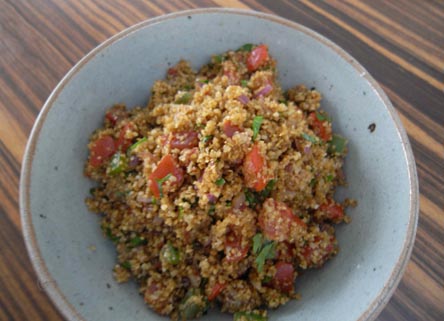6 Aug
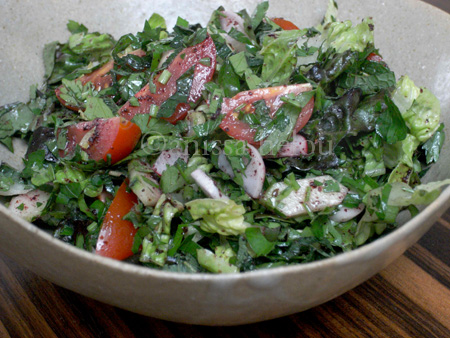
It’s nearly forty years since I left Lebanon. There were many things that I hated about Beirut and many that I loved. I still feel the same although much of what I loved is disappearing, like the ambulant vegetable and fruit vendors who sell their produce off wooden carts which they push through neighbourhoods while shouting out their wares. A guy like the sombrero-wearing man below would belt out “yalla ‘ala banadurah, yalla ‘ala khiyar” to let everyone know he had tomatoes and cucumbers which he may have just picked from his fields. I loved listening to their cries and always followed my mother onto the balcony to watch her bargain with the vendor to get the best possible price.
23 Jul
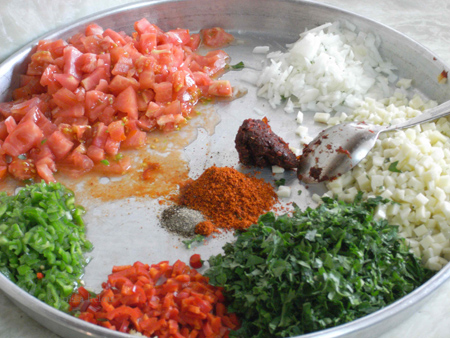
Here is a salad from Gaziantep that is very intriguing. I saw it being made at the home of Belgin, a wonderful cook, and a friend of my great friend Filiz who is an authority on the foods of Gaziantep. She introduced me to Belgin.
It starts out by looking like it’s going to be a normal salad, with beautifully chopped ingredients, arranged neatly in a tray as you can see above, waiting to be tossed together. But instead of mixing the ingredients lightly, Belgin kneads them together, and quite roughly towards the end until they are blended enough for her to shape the mixture into balls, which you can then pick up with your hand and bite into. Absolutely delicious but not quite a salad as I or you would understand it.
2 Apr
I hear the weather is rather sad in Europe. Cold and wet in Paris, the same in London and just as cold in Milan. I can’t say that I am loving Dubai but at least it is summer here, with a lot of fresh produce and herbs piled in the markets including purslane (baqleh in Arabic), one of my favourite herbs.
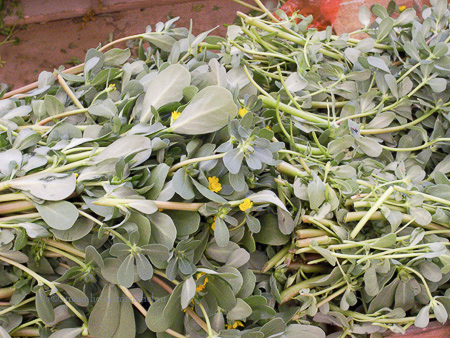
Despite the trend towards global ingredients, purslane remains little known in the west. Perhaps because it is fragile. The leaves bruise easily and you need to be careful handling it. I don’t normally wash it. Instead, I just wipe off any earth delicately with kitchen paper. And I have to admit that I very rarely buy it in London looking as fresh as it does in the pictures above and below. And I certainly cannot pick up as much of it as I want and just stuff it in a bag, as in the display here. Middle Eastern shops have the herb neatly bunched up and I often have to discard part of the bunch because the stalks are too tightly packed resulting in some of the leaves ending up spoiled.
14 Aug
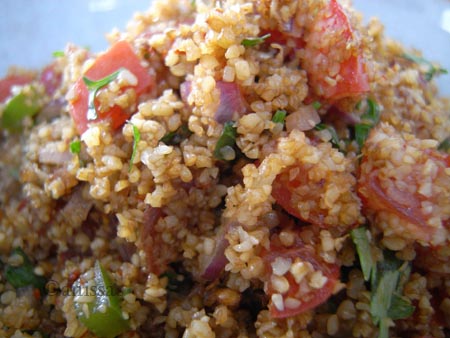
Close-up of kissir — the burghul here is even finer than the one i buy in London. I got it in Aleppo and the cook who buys it for me calls by a special name which I forgot just now!
You remember my recent post on tabbuleh and what is or isn’t the right amount of burghul? Well, I am almost sure that Kissir, a Turkish salad where the main ingredient is burghul, is why people get tabbuleh wrong. Someone must have given a recipe for kissir as tabbuleh and the misinterpretation stuck until recently that is, when some writers and chefs started using less burghul and more parsley, although still not getting the ratios quite right, at least by Lebanese standards. In any case, Kissir has hardly any parsley, a lot of tomatoes, a fair amount of onion and a tiny amount of green pepper for crunch. You can season it with lemon juice or pomegranate syrup — I prefer the latter — and the main spice is Aleppo pepper, or Isot biber, (also known as Urfa biber but this will have to be a whole new post), the Turkish equivalent. Of course, there are lots of variations. Mine is an adaptation from a recipe out of Nevin Halici’s Turkish cookbook, one of my favourites. It is sadly out of print but try to get it on one of the used books sites if you can. You’ll love it. Kissir is just as moreish as tabbuleh, and the advantage is that it is much quicker to make: 15 minutes flat from beginning to end. Here is a whole picture of the salad and a recipe. Enjoy.
Kissir
Turkish Burghul Salad
Serves 4-6
200 g fine burghul
200 ml boiling water
2 small spanish onions, very finely chopped
5 medium firm ripe tomatoes (about 500 g), deseeded, diced into 1 cm square cubes
1/2 small green bell pepper, deseeded and diced small
few sprigs flat-leaf parsley, most of the stalk discarded, finely chopped
4 tablespoons extra virgin olive oil
1 teaspoon Aleppo pepper
1 1/2 tablespoons pomegranate syrup, (or 3 tablespoons lemon juice)
sea salt to taste
1. Put the burghul in a large mixing bowl and stir in the water a few spoonfuls at a time. Cover with a kitchen towel and let sit for 15 minutes.
2. When the time is up, add the onion to the burghul and mix well. Add the other ingredients together with the seasonings. Mix well. Taste and adjust the seasoning if necessary. Serve immediately.

